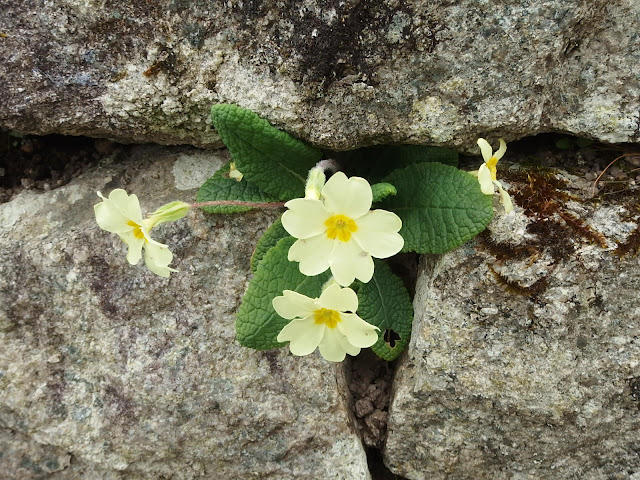Against the Odds: Primroses
And in the wood, where often you and I
Upon faint primrose-beds were wont to lie...
William Shakespeare, in: A Midsummer Night's Dream. As Shakespeare is the man of the moment, so consider the above as my small contribution to the festivities.
Primroses are amongst our favourite spring flowers, especially as they're a native wildflower. It's name is derived from the Latin, prima rosa, meaning the first rose of the year, though it's not a member of the rose family.
Primrose-beds aren't as common as they were in Shakespeare's time due to over picking. Now they're protected by law and I'm always pleased to see a huge bank of them on my way to my allotment at this time of the year. A perennial plant, they can reach maturity in a single year and may self-seed prolifically. It means they can recover well if conditions are right. We found lots of them on holiday in Cornwall too.
A more surprising sight was the pictured plant at Wheal Martyn China Clay Museum. Primroses like moist, clay conditions and judging by the accompanying vegetation, there must be a thin soil amongst the stones, just enough for plants to find a foothold.
The colour of the water is due to china clay particles. Perhaps these get washed into the gaps in the wall when the water is higher, thus allowing the process of soil formation to start.
It wasn't a one-off occurrence either. I found these in the wall at the museum's entrance, where there isn't the nearby presence of water and clay to explain how this one gained its delicate foothold.












What a lovely find. Enterprising primrose finds perfect niche!
ReplyDeleteThey were quite a surprise amongst the more heath-like vegetation found at the site :)
DeleteSo that's why the water is greyish white. I thought at first it was a covering of frost. There must be a pottery near there? Also, I didn't know primroses were protected by law so an altogether teaching post and I thank you. Lovely.
ReplyDeleteIt's a china clay mine rather than a pottery, Bren. They export it all over the world and you probably used some when brushing your teeth this morning!
DeleteWe have them self seeding on our plot too - they are a great favourite
ReplyDeleteOoh, I must try that...
Delete